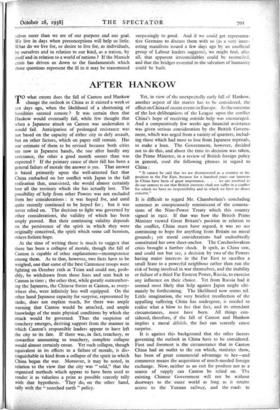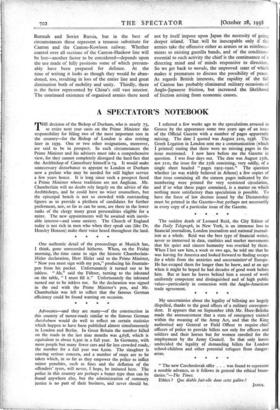AFTER HANKOW T O what extent does the fall of Canton
and HankoW change the outlook in China as it existed a week or ten days ago, when the likelihood of a shortening of hostilities seemed remote ? It was certain then that Hankow would eventually fall, while few thought that when a Japanese attack on Canton was undertaken it would" fail. Anticipation of prolonged resistance was not based ,on the capacity of either -city to defy assault, but on other factors, which on paper still remain. Has our- estimate of them to be revised because both cities are now in Japanese hands, the one after hardly any resistance, the other a good month sooner than was expected ? If the primary cause of their fall has been a general failure of morale the answer is yes. That answer is based primarily upon the well-attested fact that China embarked on her conflict with Japan in the full realisation that, Unassisted, she would almost certainly lose all the territory which she his -actually lost. The possibility of help from other Powers was not excluded from her - considerations : it was hoped for, and until quite recently continued to be hoped for ; but it was never relied on. The decision to fight was governed by other considerationi, the validity of which has been amply proved. But their continuing Validity depends on the persistence of the spirit in which they were originally conceived, the spirit which some call heroism, others forlorn hope.
At the time of writing there is much to suggest that there has been a collapse of morale, though the fall of Canton is capable of other explanations—incompetence among them. As to that, however, two facts have to be weighed, one that some of the best Cantonese troops were fighting on October ',nth at Teian and could not, prob- ably, be withdrawn from those lines and sent back to Canton in time ; the other that, while greatly outnumber:- ing the Japanese, the Chinese forces at Canton, as every- where else, were infinitely less well equipped. On the other hand Japanese capacity for surprise, represented by tanks, does -not explain much, for there was ample warning that Canton would be attacked, and ample knowledge of the main physical conditions by which the attack would • be governed. Thus the suspicion of treachery emerges, deriving support from the manner in which Canton's responsible leaders appear to have left the city tnits fate. If there was, in fact, treachery, or cowardice amounting to treachery, complete collapse would almost certainly ensue. -Yet such collapse, though equivalent in its- effects to a failure of morale, is dis- tinguishable in kind from a collapse of the spirit in which China began the war. Moreover, it may be noted, in relation to the view that the city was " sold," that the organised methods which appear to have been used to render it as valueless a prize as possible scarcely tally with that hypothesis. They do, on the other hand, tally with the " scorched earth " policy. Yet, in view of the unexpectedly early fall of Hankow, another aspect of the matter has to be considered, the effect on China of recent events in Europe. As the outcome of the last deliberations of the League upon the conflict China's hope of receiving outside help was encouraged. And a comparatively few weeks ago financial assistance was given serious consideration by the British Govern- ment, which was urged from a variety of quarters, includ- ing those which had most to lose from Japanese reprisals, to make a loan. The Government, however, decided not to do this, and about the time its decision was taken, the Prime Minister, in a review of British foreign policy in general, used the following phrases in regard to China " It cannot be said that we are disinterested as a country in the position in the Far East, because for a hundred years our interests in China have been of great importance, . . . we are resolved to do our utmost to see that British interests shall not suffer in a conflict for which we have no responsibility and in which we have no direct concern."
It is difficult to regard Mr. Chamberlain's concluding sentence as conspicuously reminiscent of the connota- tions of the Nine-Power Treaty which this country signed in 1922. If that was how the British Prime Minister viewed Great Britain's position in relation to the conflict, China must have argued, it was no use continuing to hope for anything from Britain on moral grounds; yet moral considerations had undoubtedly constituted her own sheet-anchor. The Czechoslovakian crisis brought a further shock. It spelt, as China saw, and could not but see, a decision by two of the Powers having major interests in the Far East to sacrifice a small State to a powerful neighbour rather than run the risk of being involved in war themselves, and the inability or failure of a third Far Eastern Power, Russia, to exercise any influence on their Choice. Yet from Russia had it seemed most likely that help against Japan might ulti- mately be forthcoming. The likelihood now seems nil. Little imagination, the very briefest recollection of the appalling suffering China has undergone, is needed to realise what a blow to her that fact, and its attendant circumstances, must have been. All things con- sidered, therefore, if the fall of Canton and HankoW implies a moral debacle, the fact can scarcely cause surprise. • It is against this background that the other factors governing the outlook in China have to be considered. First and foremost is the circumstance that in Canton China had an outlet to the sea Which, statistics show, has been of great commercial advantage to her—and commerce means the acquisition of much-needed foreign exchange. Now, neither as an exit for produce nor as a source of supply can Carlton be relied on. The existing Chinese– Government will not be without doorways to the -outer world as long as it retains access to the Yunnan railway, and the roads to Burmah and Soviet Russia, but in the best of circumstances these represent a . tenuous substitute for Canton and the Canton-Kowloon railway. Whether control over all sections of the Canton-Hankow line will be lost—another factor to be considered—depends upon the use made of hilly positions some of which presum- ably have been prepared for defence. At the time of writing it looks as though they would be aban- doned, too, resulting in loss of the entire line and great diminution both of mobility and unity. Thirdly, there is the factor represented by China's still vast interior. The continued existence of organised armies there need not by itself impose upon Japan the necessity of going deeper inland: That, will be inescapable only if the armies take the offensive either as armies or as reinforce- ments to existing guerilla bands, and of the conditions essential to such activity the chief is the continuance of a directing mind and of minds responSive to direction. So we get back to morale, the unproved state of which makes it premature to discuss the possibility of peace. As regards British interests, the rapidity of the fall of Canton has probably eliminated military occasions of Anglo-Japanese friction, but increased the. likelihood of friction arising from economic causes.

























































 Previous page
Previous page